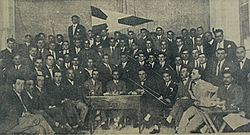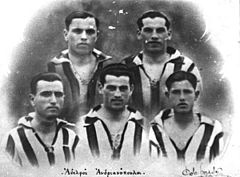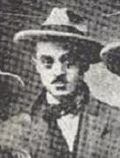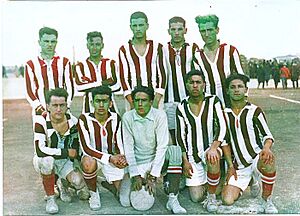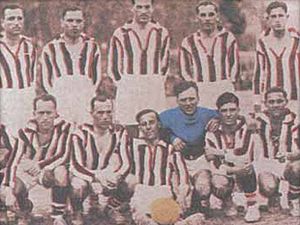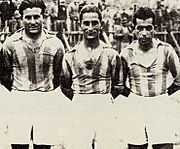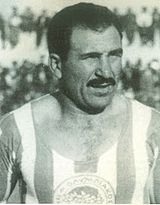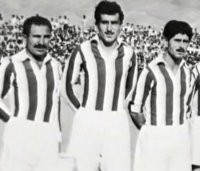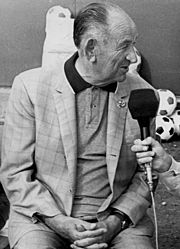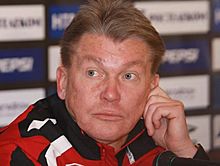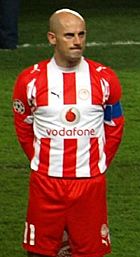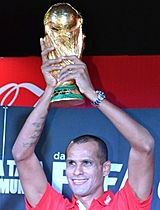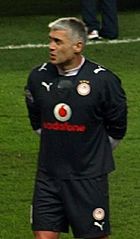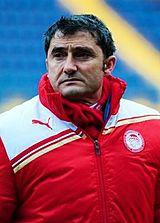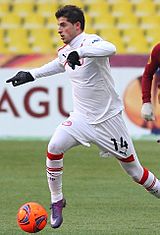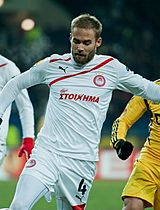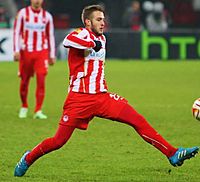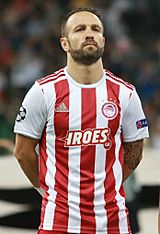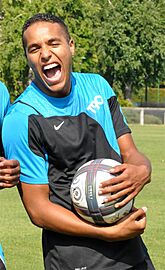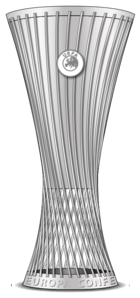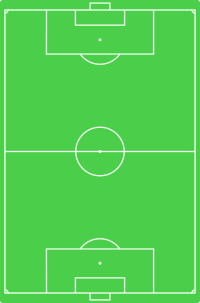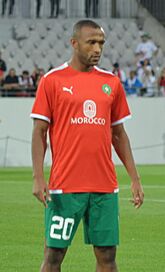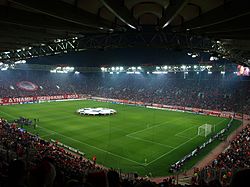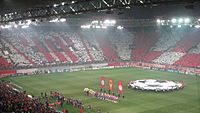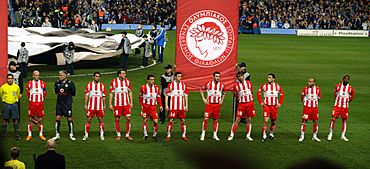Olympiacos F.C. facts for kids
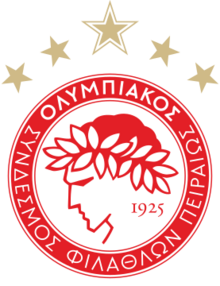 |
||||
| Full name | Ολυμπιακός Σύνδεσμος Φιλάθλων Πειραιώς Olympiakos Sýndesmos Filáthlon Peiraiós (Olympiacos Association of fans of Piraeus) |
|||
|---|---|---|---|---|
| Nickname(s) | Thrylos (Legend) Erythroleykoi (Red-Whites) |
|||
| Founded | 10 March 1925 | |||
| Ground | Karaiskakis Stadium | |||
| Capacity | 33,334 | |||
| Owner | Evangelos Marinakis | |||
| President | Evangelos Marinakis | |||
| Manager | José Luis Mendilibar | |||
| League | Super League Greece | |||
| 2024–25 | Super League Greece, 1st of 14 (Champions) | |||
|
||||
Olympiacos Football Club, often just called Olympiacos, is a professional football team from Piraeus, Greece. It's part of a bigger sports club called Olympiacos CFP. The club's name comes from the ancient Olympic Games, and its symbol, a laurel-crowned Olympic athlete, represents the Olympic ideals of ancient Greece. Their home stadium is the Karaiskakis Stadium in Piraeus, which can hold 33,334 fans.
Olympiacos was founded on March 10, 1925. They are nicknamed Thrylos, which means "Legend," because they are the most successful club in Greek football history. They have won 48 league titles, 29 Cups, and 4 Super Cups, holding the record for all these competitions.
In 2024, their U-19 team won the UEFA Youth League, which was their first European title. The main team also won the UEFA Conference League in 2024, becoming the first Greek club to win a major European trophy. They have won over 100 trophies in total, showing their amazing success. Olympiacos has also won the Greek League title seven times in a row on two occasions (1997–2003 and 2011–2017). They are one of only three clubs that have never been relegated from the top Greek football league.
Olympiacos is the most popular football club in Greece. They have many fans in Greece and among Greek communities worldwide. They have big rivalries with other teams like Panathinaikos, which is known as the "derby of the eternal enemies". They also have rivalries with AEK and PAOK.
Contents
- Club History
- Early Days (1925–1931)
- Greek Dominance and World War II (1931–1946)
- The Legend Continues (1946–1959)
- First International Success and Márton Bukovi Era (1960–1972)
- Goulandris Era (1972–1975)
- Dominance in the Early 1980s (1975–1987)
- The "Stone Years" and European Cup Winners' Cup Quarter-Finals (1987–1996)
- The Golden Era (1996–2010)
- New Presidency, Seven Consecutive League Titles, and European Rise (2010–2017)
- European Successes and Three Consecutive Greek League Titles (2017–2023)
- UEFA Europa Conference League Winners & UEFA Youth League Winners (2023–24)
- Globe Soccer Awards
- Return to Championships
- Centenary
- Crest and Colours
- Stadium
- Support
- Rivalries
- European and International Performance
- Honours
- Players
- Former Players
- Personnel
- Management
- Statistics
- Images for kids
- See also
Club History
Early Days (1925–1931)
Olympiacos was started on March 10, 1925, in the city of Piraeus. The goal was to help young athletes grow and spread the Olympic ideal of sportsmanship. Two older clubs joined together to form this new team. Notis Kamperos, a navy officer, suggested the name Olympiacos and the emblem of a laurel-crowned Olympic winner. He wanted a name that showed "strength, athletic power, good values, fair play, and winning."
Michalis Manouskos added to the name, making it Olympiacos Syndesmos Filathlon Pireos, which means "Olympiacos Association of Fans of Piraeus." The Andrianopoulos family, with five brothers, played a huge part in the club's early success. They were all great players. Yiannis chose the club's colors: red for passion and victory, and white for purity and fair competition.
The five Andrianopoulos brothers formed a legendary attacking team. Olympiacos quickly became very popular and successful. Their fans were mostly working-class people. They won the Piraeus Championship in 1925 and 1926.
In 1926, the Hellenic Football Federation was created and started the first national championship. Olympiacos won the Piraeus Championship many times in these early years. They even went undefeated against all Greek teams for three years (1926-1929), with 30 wins and 6 draws. This amazing performance led the Greek newspapers to call Olympiacos Thrylos ("Legend") for the first time.
In the 1930–31 season, Olympiacos won the Panhellenic Championship for the first time. This was a big moment that started a very successful period for the club. They won the title convincingly, with 11 wins, 2 draws, and only one loss.
Greek Dominance and World War II (1931–1946)
In the 1930s, new star players like Giannis Vazos, Christoforos Raggos, and Theologos Symeonidis joined the team. Olympiacos won five more championships between 1932 and 1938. By 1940, they had won six of the first eleven national championships. Giannis Vazos was especially amazing, scoring 450 goals for the club and winning the top scorer award four times.
When Fascist Italy invaded Greece in 1940, many Olympiacos players joined the army to fight. Some players were injured, and others joined the Greek Resistance against the Nazis. Nikos Godas, a famous Olympiacos player, was a captain in the Greek resistance and was executed while wearing his Olympiacos shirt. The war and occupation greatly affected the club's progress.
The Legend Continues (1946–1959)
After World War II, Olympiacos continued its strong performance. From 1946 to 1959, they won 9 out of 11 Greek Championships. This included winning six championships in a row from 1954 to 1959, which was a record for 44 years. During this time, they also won 8 Greek Cups, including six "Doubles" (winning both the league and the cup in the same season).
This period, with players like Andreas Mouratis, Ilias Rossidis, and Ilias Yfantis, made Olympiacos incredibly popular. Their amazing success in the 1950s cemented their nickname Thrylos ("The Legend").
On September 13, 1959, Olympiacos became the first Greek club to play in a European competition, facing Milan in the 1959–60 European Cup. They drew 2-2 at home, with Kostas Papazoglou scoring the first ever European goal for a Greek club.
First International Success and Márton Bukovi Era (1960–1972)
In the 1960s, Olympiacos won the Greek Cup five times in a row, which is still a record. In 1963, they became the first Greek club to win an international competition, the Balkans Cup. They beat teams like Galatasaray and Levski Sofia to win this important trophy.
To improve their league performance, Olympiacos hired the famous Hungarian coach Márton Bukovi in the mid-1960s. Bukovi was a tactical genius who made the team play exciting, attacking football. Under him, Olympiacos won two straight Greek Championships in 1966 and 1967. Fans loved Bukovi's team so much that they even made a special song for them.
However, a military government took over Greece in 1967. This had a bad effect on Olympiacos. The club's president was forced out, and Márton Bukovi was also forced to leave Greece.
Goulandris Era (1972–1975)
In 1972, Nikos Goulandris became the club's president. He brought back important people to the board and signed top players like Giorgos Delikaris and Yves Triantafyllos. Under Goulandris, Olympiacos won the Greek Championship three times in a row (1972–73, 1973–74, 1974–75). They also won two "Doubles" in this period. In the 1972–73 season, they set a record by only letting in 13 goals in 34 matches. The 1973–74 season was even better, as they scored a record 102 goals and only let in 14.
In European games, they beat Cagliari from Italy, becoming the first Greek club to win in Italy. They also beat Tottenham Hotspur, ending their long unbeaten run in Europe. In 1974, they famously beat Kenny Dalglish's Celtic in the 1974–75 European Cup. They almost made a huge comeback against Anderlecht, winning 3-0 after losing 5-1 in the first game, but controversial referee decisions stopped them.
Dominance in the Early 1980s (1975–1987)
After 1975, the team had a quieter period. But in 1979, football in Greece became professional, and Stavros Daifas became the club's owner. Olympiacos became dominant again, winning the league title four times in a row (1980, 1981, 1982, 1983). Key players during this time included the goalscorer Nikos Anastopoulos and Tasos Mitropoulos.
Coaches like Kazimierz Górski and Alketas Panagoulias led the team to these victories. Panagoulias also guided them to another league title in 1987.
The "Stone Years" and European Cup Winners' Cup Quarter-Finals (1987–1996)
From the late 1980s to the mid-1990s, Olympiacos faced tough times. The club had financial problems and went nine seasons without winning a league title. This period is known as the "stone years." However, they still managed to win the Greek Cup in 1990 and 1992, and the Greek Super Cup in 1992.
Under the Ukrainian coach Oleg Blokhin, Olympiacos reached the quarter-finals of the 1992–93 European Cup Winners' Cup in 1993. They beat Arsène Wenger's Monaco but were then knocked out by Atlético Madrid.
The Golden Era (1996–2010)
Seven Consecutive League Titles and Near Miss in Champions League (1996–2003)
In 1996, Sokratis Kokkalis became president and hired Dušan Bajević as coach. They brought in strong players like Predrag Đorđević and Stelios Giannakopoulos. Olympiacos then won the 1996–97 title, ending the "stone years" and starting a period of great success. They won the league again in 1997–98.
The 1998–99 season was one of Olympiacos's best. They won the 1998–99 Greek Championship and the 1998–99 Greek Cup, completing a "Double." In the 1998–99 UEFA Champions League, they won their group and reached the quarter-finals. They faced Juventus and almost made it to the semi-finals, but a late goal by Juventus knocked them out. Despite this, it was a very successful season.
Over the next four seasons (1999–2003), Olympiacos signed world-class players like Giovanni, Zlatko Zahovič, and Christian Karembeu. They won seven consecutive Greek Championships, breaking their own record. They won their seventh title in 2003 by beating rivals Panathinaikos 3-0 in a crucial match.
Five Consecutive League Titles and Champions League Appearances (2004–2010)
In 2004, Olympiacos brought back Dušan Bajević and signed Brazilian superstar Rivaldo and European champion Antonis Nikopolidis. They won the domestic "Double" and had a good Champions League run, narrowly missing out on the knockout stage.
Later, under coach Trond Sollied, Olympiacos won all four derbies against Panathinaikos and AEK Athens in the 2005–06 season. They also won the Greek Cup, completing another "Double." They set a record with 16 consecutive wins in the league.
In 2007, Olympiacos made big transfers, signing players like Luciano Galletti and Darko Kovačević. They had a great Champions League campaign, reaching the last 16 by finishing second in their group, ahead of Werder Bremen and Lazio. They won both the Greek Championship and Cup that season.
In 2008, Ernesto Valverde became the new coach. Olympiacos won the Greek Championship and Greek Cup, celebrating their 14th "Double." In 2009, they signed more important players like Olof Mellberg and Enzo Maresca. Under coach Zico, they reached the Champions League last 16 again, but were eliminated by Bordeaux.
New Presidency, Seven Consecutive League Titles, and European Rise (2010–2017)
In 2010, Evangelos Marinakis became the new owner. He brought back Ernesto Valverde as coach and signed international players like Albert Riera and Kevin Mirallas. Olympiacos won the Greek title for the 38th time.
In the 2011–12 season, Olympiacos won both the Greek league and the Greek Cup, completing their 15th "Double." They had a strong Champions League performance, winning against Arsenal and Borussia Dortmund at home, but narrowly missed the knockout stage. They then reached the Last 16 in the UEFA Europa League.
After Valverde left, Leonardo Jardim and then Míchel coached the team. Olympiacos won their 40th Greek Championship and their 26th Greek Cup, earning a fourth star on their crest.
The 2013–14 season was also very successful. With new players like Javier Saviola and Joel Campbell, Olympiacos qualified for the Last 16 of the Champions League. They beat Manchester United 2-0 at home but lost the second game, missing out on the quarter-finals. Domestically, they won their 41st Greek Championship.
In the 2014–15 season, Olympiacos had a good Champions League group stage, beating Atlético Madrid and Juventus at home. They won their 42nd Greek Championship and their 27th Greek Cup, achieving their 17th "Double."
The 2015–16 season saw Marco Silva become manager. Olympiacos had a tough Champions League group but managed to beat Arsenal away, which was a big victory. They won their 43rd Greek Championship very early in the season, setting a national record. They finished with a huge 30-point lead over Panathinaikos.
The 2016–17 season was a bit difficult with many changes in coaches. However, Olympiacos still won their 44th Greek Championship, which was their seventh in a row for the second time in Greek football history.
European Successes and Three Consecutive Greek League Titles (2017–2023)
In the 2017–18 season, Olympiacos qualified for the Champions League group stage. They were in a very tough group with Barcelona, Juventus, and Sporting CP. They struggled in Europe that year, but still managed to win the Greek Super League title.
The 2018–19 season saw Olympiacos recover. They qualified for the Europa League group stages and famously beat AC Milan to advance to the Round of 32. Domestically, they finished second in the league.
Under coach Pedro Martins, the 2019–20 season was one of Olympiacos's best in recent years. They qualified for the Champions League group stage again. In the Europa League, they had a historic moment by eliminating their rivals Arsenal with a late goal in extra time. They then faced Wolves but were eliminated. Domestically, they won their first league title since 2017 with a record 91 points and also won the Greek Cup, completing a "Double."
The 2020–21 season saw Olympiacos qualify for the Champions League group stage again. They then moved to the Europa League and eliminated PSV Eindhoven. They faced Arsenal again but were eliminated. Domestically, they dominated the league once more, finishing 26 points ahead of second place.
In the 2021–22 season, Olympiacos won another Greek League title. Coach Pedro Martins stayed for a fifth year, becoming one of the longest-serving managers at the club. In August 2022, Martins left, and the club had a few different coaches before José Anigo finished the 2022–23 season.
UEFA Europa Conference League Winners & UEFA Youth League Winners (2023–24)
The 2023–24 Season was amazing for Olympiacos in Europe. After starting in the Europa League, they moved to the Europa Conference League. In the Round of 16, they lost 1-4 at home to Maccabi Tel Aviv. However, in the return game, they made one of the greatest comebacks in European football history, winning 6-1 in extra time!

They reached a European quarter-final for the first time since 1999. They then faced Fenerbahçe, winning on penalties thanks to their young goalkeeper Konstantinos Tzolakis saving three penalties. This was Olympiacos's first-ever European semi-final.
In the semi-final, Olympiacos played against Aston Villa, a strong English team. Olympiacos surprised everyone by winning both games with a total score of 6-2, with Ayoub El Kaabi scoring five goals. This meant Olympiacos reached a European final for the first time since 1971.
The final was held in Athens on May 29, 2024, against Italian team ACF Fiorentina. It was a very close game, ending 0-0 after 90 minutes. In the 116th minute of extra time, El Kaabi scored the winning goal, making Olympiacos the first Greek football club to win a UEFA competition! This is seen as one of the greatest achievements in Greek football history.
Just five weeks before this, the Olympiacos Youth U-19 team also won the UEFA Youth League by beating Milan in the final. This meant Olympiacos became the first club in European football to win two UEFA trophies in the same season!
Globe Soccer Awards
Olympiacos was recognized as the "revelation team" of 2024 at the Globe Soccer Awards.
Return to Championships
In 2025, under coach Mendilibar, the club won the 2024-25 Super League title, their first domestic title in two years. They also won the 2024-25 Greek Cup, achieving their 19th "Double."
Centenary
In March 2025, Olympiacos Football Club celebrated its 100th birthday! They held many events and activities at the "G. Karaiskakis" Stadium and around Piraeus to honor their long history and passionate fans.
Crest and Colours
When Olympiacos was formed in 1925, its name was inspired by the Ancient Olympic Games, which stood for good values, competition, and fair play. The club chose a laurel-crowned young person as its emblem, symbolizing an Olympic winner. This emblem has changed only a little over the years. Red and white were chosen as the club's colors: red for passion and victory, and white for good values and purity.
The team's main uniform is a shirt with red and white vertical stripes, with red or white shorts and socks. Sometimes the stripes are thin, and sometimes they are wider. The team also uses all-red or all-white uniforms as their second or third choices.
Kit Manufacturers and Shirt Sponsors
Since 1979, Olympiacos has had specific companies make their uniforms and sponsor their shirts.
| Period | Kit manufacturer | Shirt sponsor |
|---|---|---|
| 1979 | Umbro | — |
| 1980 | Puma | |
| 1980–1982 | ASICS Tiger | |
| 1982 | Adidas | |
| 1982–1984 | ASICS Tiger | Fiat |
| 1984–1985 | Travel Plan | |
| 1985–1988 | Puma | Citizen |
| 1988 | Toyota | |
| 1989 | Bank of Crete | |
| 1989–1990 | — | |
| 1990–1992 | Diana | |
| 1992–1993 | Umbro | |
| 1993–1994 | Lotto | |
| 1994–1995 | Adidas | Ethnokarta MasterCard |
| 1995–1997 | Puma | |
| 1997–2000 | Aspis Bank | |
| 2000–2005 | Umbro | Siemens Mobile |
| 2005–2006 | Puma | Siemens |
| 2006–2009 | Vodafone | |
| 2009–2010 | Citibank | |
| 2010–2013 | Pame Stoixima | |
| 2013–2015 | UNICEF | |
| 2015– | Adidas | Stoiximan.gr |
Stadium
The Karaiskakis Stadium in Piraeus is the home of Olympiacos. It can hold 32,115 people, making it the second-largest football stadium in Greece. It was first built in 1895 for the 1896 Summer Olympics in Athens. Olympiacos started using it in 1925. In 1964, it was renovated and named after Georgios Karaiskakis, a hero from the Greek War of Independence.
Olympiacos sometimes played at the Athens Olympic Stadium for a few years. In 2003, the old Karaiskakis Stadium was torn down and a new, modern one was built for the 2004 Summer Olympics. Olympiacos has exclusive use of the stadium until 2052. Today, it's one of the most modern football stadiums in Europe and also has the Olympiacos museum.
Support
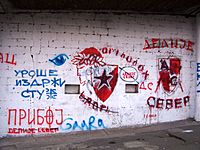
Olympiacos has a huge fanbase, especially from Piraeus and Athens. Their popularity grew a lot in the 1950s. Olympiacos is the most popular Greek club, with about 30-40% of all football fans in Greece supporting them. They have the highest average attendance in Greek football history.
Friendships
Olympiacos and Red Star Belgrade fans have a strong friendship, calling themselves the "Orthodox Brothers." Fans often visit each other's matches. More recently, fans of Spartak Moscow have also joined this friendship.
Olympiacos fans are known for their passionate support. The atmosphere at their home matches is often described as amazing and intimidating. Many famous football players and club owners have praised the incredible support of Olympiacos fans.
The Gate 7 Tragedy
On February 8, 1981, a sad event happened at the Karaiskakis Stadium, known as the Karaiskakis Stadium disaster. After Olympiacos won a game 6-0 against AEK Athens, many fans at Gate 7 rushed to leave. However, the doors were almost closed, and people were crushed. Twenty-one young people died, mostly from suffocation, and many more were injured.
Every year on February 8, a memorial service is held at the stadium to remember those who died. Thousands of fans attend, chanting, "Brothers, you live, you are the ones who guide us." At Gate 7 in the stadium, some seats are black instead of red, forming the number "7." There is also a monument with the names of all 21 victims. This tragedy is remembered by many teams, not just Olympiacos, as a sad day for Greek sports.
Rivalries
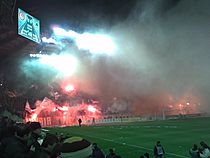
Olympiacos's biggest rival is Panathinaikos. Their matches are called the "derby of the eternal enemies" and are the most famous in Greek football. These two clubs are the most successful in Greece, having won a combined 68 league titles. The rivalry also has historical and social roots, though these differences are less strong today.
Olympiacos also has rivalries with AEK Athens and PAOK. The rivalry with PAOK is especially fierce because they are two of the most popular clubs from different regions of Greece. There used to be a strong local rivalry with Ethnikos Piraeus, but this has faded as Ethnikos now plays in lower divisions.
European and International Performance
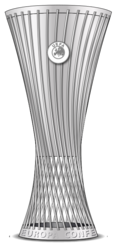
Olympiacos is the most successful Greek football club in European competitions. They are the only Greek club to have won a major European trophy, the UEFA Conference League in 2023–24. They won the final against Fiorentina 1-0. This made them the first club outside Europe's top four leagues to win a UEFA competition since 2011.
They are also the highest-ranked Greek club in the UEFA rankings. Olympiacos has played the most games in European competitions for a Greek team, reaching their 200th match in 2010. They also hold the record for the highest attendance for a Greek club in a European match, with 75,263 fans.
Olympiacos first played in Europe on September 13, 1959, against Milan. They were the first Greek club to compete in a European competition and the first to advance to the next round.
Besides their 2024 UEFA Conference League win, they reached the quarter-finals of the UEFA Champions League in 1998–99 and the quarter-finals of the UEFA Cup Winners' Cup in 1992–93.
Olympiacos has beaten many famous European clubs in different competitions, including Milan, Arsenal, Ajax, Benfica, Porto, Borussia Dortmund, Celtic, and Aston Villa. They are known for being a strong team at home in the Champions League, with many impressive wins. From 2007 to 2016, they reached the Champions League knockout stage (Last 16) three times.
Olympiacos also won the Balkans Cup in 1963, which was the first international trophy won by any Greek football club.
Another big European success was achieved by the Olympiacos U-19 team in 2024. They won the UEFA Youth League against AC Milan in the final. This meant Olympiacos won two out of four official UEFA club competitions in the 2023–24 season, becoming the first club in Europe to do so.
The youth team also played in the Under-20 Intercontinental Cup final in 2024 but lost to Flamengo.
UEFA Competition Record
| European Team |
Competition | Season | Pld | W | D | L | GF/GA |
|---|---|---|---|---|---|---|---|
| Olympiacos | European Cup / UEFA Champions League | 35 | 186 | 66 | 36 | 84 | 222–283 |
| Olympiacos | UEFA Cup Winners' Cup | 9 | 33 | 14 | 6 | 13 | 43–47 |
| Olympiacos | UEFA Cup / UEFA Europa League | 28 | 137 | 58 | 28 | 51 | 197–175 |
| Olympiacos | UEFA Europa Conference League | 1 | 9 | 7 | 0 | 2 | 19–10 |
| Results | Total | 69 | 365 | 145 | 70 | 150 | 481–515 |
Best Campaigns
| Season | Achievement | Notes |
|---|---|---|
| European Cup / UEFA Champions League | ||
| 1974–75 | Last 16 | eliminated by Anderlecht |
| 1982–83 | Last 16 | eliminated by Hamburg |
| 1983–84 | Last 16 | eliminated by Benfica |
| 1998–99 | Quarter-finals | eliminated by Juventus |
| 2007–08 | Last 16 | eliminated by Chelsea |
| 2009–10 | Last 16 | eliminated by Bordeaux |
| 2013–14 | Last 16 | eliminated by Manchester United |
| European Cup Winners' Cup | ||
| 1961-62 | Last 16 | eliminated by Dynamo Žilina |
| 1963–64 | Last 16 | eliminated by Lyon |
| 1965–66 | Last 16 | eliminated by West Ham United |
| 1968–69 | Last 16 | eliminated by Dunfermline Athletic |
| 1986–87 | Last 16 | eliminated by Ajax |
| 1990–91 | Last 16 | eliminated by Sampdoria |
| 1992–93 | Quarter-finals | eliminated by Atlético Madrid |
| UEFA Cup / UEFA Europa League | ||
| 1989–90 | Last 16 | eliminated by Auxerre |
| 2004–05 | Last 16 | eliminated by Newcastle United |
| 2011–12 | Last 16 | eliminated by Metalist Kharkiv |
| 2016–17 | Last 16 | eliminated by Beşiktaş |
| 2019–20 | Last 16 | eliminated by Wolverhampton Wanderers |
| 2020–21 | Last 16 | eliminated by Arsenal |
| UEFA Conference League | ||
| 2023–24 | Winners | defeated Fiorentina 1–0 in the final of Athens |
| UEFA Youth League | ||
| 2023–24 | Winners | defeated AC Milan 3–0 in the final of Nyon |
| Under-20 Intercontinental Cup | ||
| 2024 | Runner's up | lost against Flamengo 1–2 in the final of Maracanã |
| Balkans Cup | ||
| 1961–63 | Winners | won against Levski Sofia |
UEFA Ranking
Current ranking.
| Rank | Team | Points |
|---|---|---|
| 42 | 49.000 | |
| 43 | 48.000 | |
| 44 | 48.000 | |
| 45 | 47.000 | |
| 46 | 45.000 |
5-year club ranking at the end of season 2018–19.
| Rank | Club | Points gained in season | Total | ||||
|---|---|---|---|---|---|---|---|
| 2019–20 | 2020–21 | 2021–22 | 2022–23 | 2023–24 | |||
|
|
10.000 | 9.000 | 16.000 | 7.000 | 7.000 | 49.000 | |
|
|
– | 6.000 | 16.000 | 8.000 | 18.000 | 48.000 | |
| 10.000 | 10.000 | 8.000 | 3.000 | 17.000 | 48.000 | ||
|
|
5.000 | 8.000 | 17.000 | – | 17.000 | 47.000 | |
|
|
10.000 | 3.000 | 11.000 | 11.000 | 10.000 | 45.000 | |
10-year club ranking at the end of season 2023–24.
| Rank | Club | Points gained in season | Total | |||||||||
|---|---|---|---|---|---|---|---|---|---|---|---|---|
| 2014–15 | 2015–16 | 2016–17 | 2017–18 | 2018–19 | 2019–20 | 2020–21 | 2021–22 | 2022–23 | 2023–24 | |||
|
|
– | – | – | 11.000 | 2.500 | 20.000 | 17.000 | 16.000 | – | 28.000 | 94.500 | |
|
|
17.000 | 19.000 | 12.000 | 14.000 | 10.000 | 9.000 | 5.000 | 8.000 | – | – | 94.000 | |
|
|
11.000 | 10.000 | 10.000 | 5.000 | 8.000 | 10.000 | 10.000 | 8.000 | 3.000 | 17.000 | 92.000 | |
|
|
16.000 | 18.000 | 8.000 | 12.000 | 11.000 | 6.000 | 10.000 | 5.000 | 3.000 | 2.500 | 91.500 | |
|
|
– | 14.000 | – | 17.000 | 6.000 | 4.000 | 17.000 | 9.000 | 6.000 | 18.000 | 91.000 | |
Honours
| Type | Competition | Titles | Seasons |
|---|---|---|---|
| Continental | UEFA Europa Conference League | 1s | 2023–24 |
| UEFA Youth League | 1 | 2023–24 | |
| Balkans Cup | 1 | 1962–63 | |
| National | Super League Greece | 48 |
1930–31, 1932–33, 1933–34, 1935–36, 1936–37, 1937–38, 1946–47, 1947–48, 1950–51, 1953–54 |
| Greek Football Cup | 29 |
1946–47, 1950–51, 1951–52, 1952–53, 1953–54, 1956–57, 1957–58, 1958–59, 1959–60, 1960–61, 1962–63, 1964–65, 1967–68, 1970–71, 1972–73, 1974–75, 1980–81, 1989–90, 1991–92, 1998–99, 2004–05, 2005–06, 2007–08, 2008–09, 2011–12, 2012–13, 2014–15, 2019–20, 2024–25 |
|
| Greek Super Cup | 4 |
1980, 1987, 1992, 2007 |
|
| Regional | Southern Greece Championship | 2 | 1933, 1934 |
| Local | Piraeus FCA Championship | 25 | 1925, 1926, 1927, 1929, 1930, 1931, 1934, 1935, 1937, 1938, 1940, 1946, 1947, 1948, 1949, 1950, 1951, 1952, 1953, 1954, 1955, 1956, 1957, 1958, 1959 |
- record
- Doubles
- Winners (19) (record): 1946–47, 1950–51, 1953–54, 1956–57, 1957–58, 1958–59, 1972–73, 1974–75, 1980–81, 1998–99, 2004–05, 2005–06, 2007–08, 2008–09, 2011–12, 2012–13, 2014–15, 2019–20, 2024–25
Minor & Unofficial Titles
- Easter Cup
- Winners (11) (record): 1928, 1929, 1934, 1936, 1943, 1945, 1946, 1949, 1951, 1953, 1959
- Christmas Cup
- Winners (11) (record): 1943, 1948, 1951, 1952, 1953, 1954, 1956, 1959, 1960, 1961, 1962
- Greater Greece Cup
- Winners (3) (record): 1969, 1972, 1976
Friendly Tournaments
- 2 September Cups
- 1 Annual New York Multi-National Tournament
- 1 Dimitrios Aliprantis Cup
- 1 K. Karamanlis Cup
- 1 Solidarity Cup
- 1 Queen Frederica of Greece Cup
- 1 SEGAS Cup
- 1 Piraeus Mayor Cup
Youth & Academy Titles
- 3 Amateur Greek Championships
- 5 Teen Greek Championships
- 9 Under-19 Greek Championships
- 7 Under-17 Greek Championships
- 4 Under-15 Greek Championships
- 1 EPS Piraeus Cup
Players
Current Squad
|
|
Out on Loan
|
|
Other Players Under Contract
|
|
Former Players
Personnel
Coaching Staff
Technical Staff
| Position | Staff |
|---|---|
| Team manager | |
| Liaison officers | |
| Kit takers | |
| Interpreter |
Scouting Staff
| Position | Staff |
|---|---|
| Chief Scout | |
| Scouts | |
Medical Staff
| Position | Staff |
|---|---|
| Club doctor | |
| Nutritionist | |
| Physiotherapists | |
Management
| Position | Staff |
|---|---|
| President | |
| Vice Presidents | |
| Vice President
Managing Director |
|
| Vice President
General Director |
|
| Members | |
| Sports director | |
| Strategic advisor |
Former Presidents
| Years | Name |
|---|---|
| 1925–1950 | |
| 1950–1954 | |
| 1954–1967 | |
| 1967–1975 | |
| 1975–1978 | |
| 1978–1987 | |
| 1987–1988 | |
| 1988–1992 | |
| 1992–1993 | |
| 1993–2010 | |
| 2010–2017 | |
| 2017–2021 | |
| 2021–present |
Statistics
Greek Championship Records
| Outline | Record |
|---|---|
| Champions in a row | 7 (1997–2003, 2011–2017) |
| Undefeated Champions | 6 (1936–37, 1937–38, 1947–48, 1950–51, 1953–54, 1954–55) |
| Series of five or more consecutive Championships | 5 (World Record) (1933–1938, 1954–1959, 1997–2003, 2005–2009, 2011–2017) |
| Record win | 11–0 (vs Fostiras, 1973–74) |
| Most wins in a season | 30 (1999–00) |
| Most goals scored in a season | 102 (1973–74) |
| Fewest goals conceded in a season | 9 (2019–20) |
| Longest sequence of wins | 17 (1st day of 2015–16 – 17th day of 2015–16) |
| Longest sequence of unbeaten matches | 58 (3rd day of 1972–73 – 27th day of 1973–74) |
Top Scorers
The table below shows Olympiacos' top scorers in all official competitions.
| Classification | Player | Total goals |
|---|---|---|
| 1 | Giorgos Sideris | 298 |
| 2 | Nikos Anastopoulos | 197 |
| 3 | Alexis Alexandris | 170 |
| 4 | Predrag Đorđević | 158 |
| 5 | Nikos Gioutsos | 128 |
| 6 | Michalis Kritikopoulos | 102 |
| 7 | Elias Yfantis | 101 |
| 8 | Giannis Vazos | 98 |
| 9 | Giovanni | 97 |
| 10 | Youssef El-Arabi | 94 |
| 11 | Kostas Fortounis | 94 |
The next table shows the top scorers of Olympiacos only in the Greek championship.
| Classification | Player | Total goals |
|---|---|---|
| 1 | Giorgos Sideris | 224 |
| 2 | Nikos Anastopoulos | 144 |
| 3 | Alexis Alexandris | 127 |
| 4 | Predrag Đorđević | 126 |
| 5 | Nikos Gioutsos | 98 |
| 6 | Michalis Kritikopoulos | 83 |
| 7 | Kostas Fortounis | 75 |
| 8 | Aris Papazoglou | 72 |
| 9 | Youssef El-Arabi | 68 |
| 10 | Panagiotis Tsalouchidis | 65 |
Olympiacos' top scorers in European competitions.
| Classification | Player | Total goals |
|---|---|---|
| 1 | Ayoub El Kaabi | 23 |
| 2 | Youssef El-Arabi | 20 |
| 3 | Kostas Mitroglou | 15 |
| 4 | Predrag Đorđević | 15 |
| 5 | Nikos Anastopoulos | 14 |
| 6 | Kostas Fortounis | 13 |
Images for kids
See also
 In Spanish: Olympiakos Fútbol Club para niños
In Spanish: Olympiakos Fútbol Club para niños
- Olympiacos B
- Olympiacos CFP
- Olympiacos F.C. Youth Academy
- European Club Association
- List of Olympiacos F.C. players
- Olympiacos F.C. in European football
 | Frances Mary Albrier |
 | Whitney Young |
 | Muhammad Ali |


